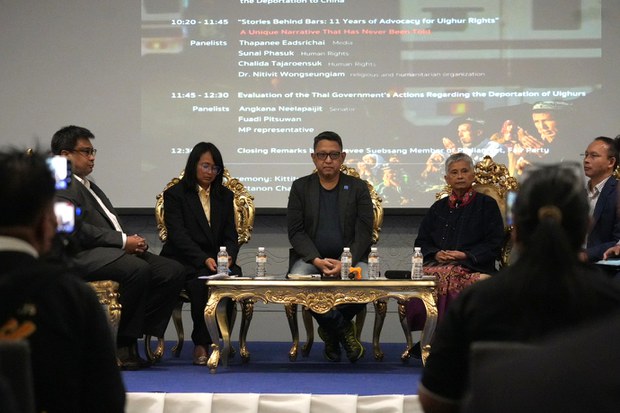Thai rights activists criticize government for deporting Uyghurs to China
2025.03.04
Bangkok
 Sunai Phasuk, senior researcher at Human Rights Watch, center, sits with members of a panel at Thailand's parliament discussing the deportation of 40 Uyghurs, March 4, 2025.
Sunai Phasuk, senior researcher at Human Rights Watch, center, sits with members of a panel at Thailand's parliament discussing the deportation of 40 Uyghurs, March 4, 2025.
Thai human rights activists criticized the government’s deportation of 40 Uyghurs to China, saying the United Nations should drop Thailand from its Human Rights Council for a decision that made the kingdom look like a Chinese vassal.
Thailand repatriated the Uyghurs to China on Feb. 27, ignoring warnings from the United States, the U.N. and human rights groups that they risked torture when returned to the northeastern region of Xinjiang, which they fled more than 10 years ago.
“The U.N. should consider removing Thailand from the Human Rights Council,” Chalida Tacharoensuk, director of the People’s Empowerment Foundation, told a meeting on the Uyghurs in parliament on Tuesday.
The U.N. General Assembly elected in October 2024 as one of 18 members for the 2025-2027 term.
“We hope there won’t be a third round of Uyghur deportations. Two rounds have been disgraceful enough,” Chalida said.
The 40 Uyghurs were part of an original cohort of more than 350 men, women and children who left China hoping to resettle abroad but were stopped and detained in Thailand in 2014.
Turkey accepted 172 while Thailand sent 109 back to China in 2015, triggering a storm of international criticism. Several have died of illness over the years and eight remain in Thailand.
Bangkok said it agreed to what was the voluntary repatriation of the men after receiving a formal request from Beijing and getting Chinese assurances they would be safe.
Thailand said it had been unable to find any third country willing to accept the men and it had an assurance from China that Thai officials would be allowed to check on their condition.
‘Vassal state’
Sunai Phasuk, senior Thai researcher at Human Rights Watch, said Thailand should push China to allow more access to the men.
“The problem is that if monitoring is done by Thailand alone, nobody will believe it,” Sunai told the meeting. “Thailand should negotiate with China to allow U.N. access, international media to enter freely, and representatives of foreign governments.”
Sunai pointed out that just months after the U.N. voted to make Thailand a member of the rights council, the kingdom was facing the condemnation of the U.S. and others over the deportation, and gained little in return.
“I don’t see what Thailand has gained aside from following China’s orders. It reduces Thailand’s status to that of a vassal state of China,” he said.
RELATED STORIES
Uyghurs in Thai prison ‘heartbroken’ to learn friends deported
Thailand’s repatriation of Uyghurs signals tilt toward China, analysts say
EXPLAINED: Thailand’s repatriation of 40 Uyghur refugees to China
Political science scholar Fuadi Pitsuwan questioned whether the Thai government had made a sufficient effort to find a third country willing to accept the Uyghurs.
“I want to ask if they gave the foreign ministry staff enough time since receiving China’s request and whether there was a clear policy that we wanted to send them to a third country,” Fuadi said during the seminar.
“If Thailand was determined enough, we would eventually have been able to find third countries for these individuals,” he said.
Sunai noted that both the Thai and Chinese governments had contributed to failure to secure a third-country offer by preventing human rights organizations and international agencies from getting access to the Uyghurs, most of whom spent a decade in an immigration detention center in Bangkok.
He expressed concern about U.N. actions.
“The U.N. is also reluctant to address the Uyghur issue because it needs donations from China. Thailand refused to allow the U.N. access to the Uyghurs,” he said.
In January, U.N. experts said the Uyghurs in Thailand would likely face torture if forced back to China.
“Many countries, such as Turkey, showed willingness but never had the opportunity to follow through with formal requests because Thailand blocked these avenues,” Sunai said.
A doctor who treated the Uyghurs since 2023 said he had never heard any of them say they wanted to go back to China in the 15 or so visits he and colleagues made to the immigration detention center.
“We spoke with almost all the Uyghur detainees. I can confirm that not once, not a single person, expressed a desire to return to China, despite the terrible conditions in detention,” Nitivit Wongseungiam said.







